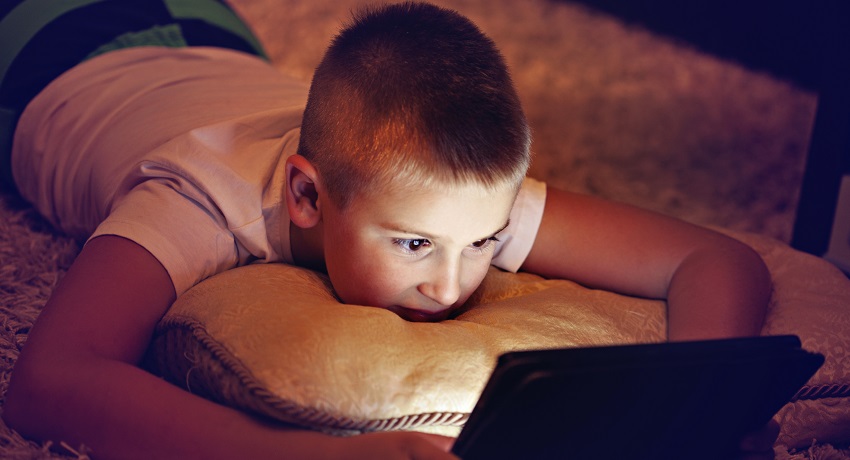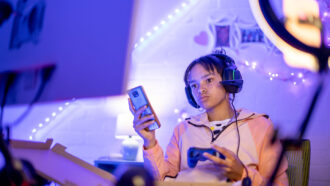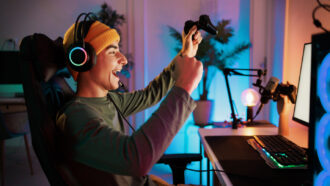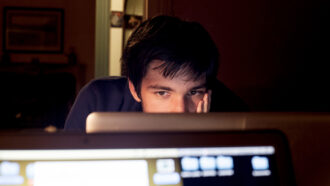Screen time can mess with the body’s ‘clock’
Reading on an iPad in the evening can make it hard for the body to fall asleep

In the five years since its introduction, the tablet computer has become a part of the lives of hundreds of millions of people, young and old. A new study finds reading on them before bedtime can hurt our sleep.
vitapix/ iStockphoto
For a good night’s sleep, here is some expert advice: Turn off, turn in and drop off.
Anyone who does the opposite — say, turning on an iPad or other similar electronic reader in bed — may have a harder time both dropping off to sleep and shaking that groggy feeling the next morning. That’s the conclusion of a new study.
Sleep experts at Brigham and Women’s Hospital in Boston, Mass., found that the light from a tablet computer upsets the body’s internal clock. And that can create real health and safety risks, the researchers say. Reading a printed book did not have the same effect. They reported their findings January 27 in the Proceedings of the National Academy of Sciences.
An internal “clock” helps regulate when we eat, sleep and wake. Exposure to the light of day and darkness of night keeps its timing set to a roughly 24-hour cycle.
For instance, starting about two hours before bedtime, our brains start to produce a hormone called melatonin. It signals our internal clock that darkness has fallen. It also prepares the body for sleep.
Scientists long have known that light at night can disrupt that internal clock. And it does so by suppressing melatonin. This prevents the body from getting the message that bedtime is near.
Electronic devices with lit screens are now hugely popular. They have added another source of artificial light at night. The new study looked specifically at the iPad. Apple has sold more than 225 million of these tablets since their introduction in 2010.
For their new study, the researchers recruited six men and six women, all in their mid 20s. Over two weeks, each spent four hours reading each evening before a 10 p.m. bedtime. The volunteers read on an iPad for five nights in a row. On another five consecutive evenings they read a printed book.
The researchers noted how long it took the volunteers to fall asleep, how long they spent asleep and how long they remained in each stage of sleep. The experts also took blood samples to measure melatonin levels.
People took nearly 10 minutes longer to fall asleep, on average, after reading on the iPads. They also spent less time in rapid-eye movement (or REM) sleep. This sleep phase appears important for learning and storing memories.
There was no difference in hours spent sleeping after reading from either the iPad or a printed book. But how volunteers felt the next day did differ.
“Our most surprising finding was that individuals using the e-reader would be more tired and take longer to become alert the next morning,” says sleep researcher Anne-Marie Chang. “This has real consequences for daytime functioning,” she says. “And these effects might be worse in the real world as opposed to the controlled environment we used.” A co-author of the study, she works at Pennsylvania State University in University Park. Previously, she worked at Brigham and Women’s Hospital.
Lighting scientist Mariana Figueiro calls the study thorough. She also finds its results unsurprising. Figueiro, who was not connected to this new study, works at Rensselaer Polytechnic Institute in Troy, N.Y. Her research has shown that spending even two hours on an iPad before bedtime can cut down the brain’s release of melatonin.
While she generally liked the study, she was concerned about “its applicability to real life.” This experiment was done in a laboratory setting under very dim lights. And that, she says, may not mimic how most people use e-readers — or read printed books.
“It’s not necessarily true,” she says, “that books are okay but e-readers are not.” She notes that “If you turn on a very bright light to read, it may have the same effect.”
What’s more, she points out, spending plenty of time exposed to natural light during the day can reduce the body’s sensitivity to artificial light at night. “The same iPad may have a much stronger effect on kids who stay indoors during the day, in dim light,” Figueiro says, “than on kids who play outdoors.”
Regularly getting too little sleep can pose important health risks. For instance, studies have shown that it can up the risk of everything from obesity, diabetes and depression to car accidents.
Power Words
(for more about Power Words, click here)
body clock (also known as biological clock) A mechanism present in all life forms that controls when various functions such as metabolic signals, sleep cycles or photosynthesis should occur.
circadian rhythm Biological functions such as body temperature and sleeping/waking times that operate on a roughly 24-hour cycle.
hormone A chemical produced in a gland and then carried in the bloodstream to another part of the body. Hormones control many important body activities, such as growth. Hormones act by triggering or regulating chemical reactions in the body.
melatonin A hormone secreted in the evening by a structure in the brain. Melatonin tells the body that it is nearing time to sleep. It plays a key role in regulating circadian rhythms.
REM sleep A period of sleep that takes its name for the rapid eye movement, or REM, that occurs. People dream during REM sleep, but their bodies can’t move. In non-REM sleep, breathing and brain activity slow, but people can still move about.
tablets (in computing) A small, hand-held computer that can connect to the Internet and that users can control using a touch screen. An Apple iPad, Samsung Galaxy and Amazon Kindle Fire are all examples of tablets.
obesity Extremely overweight. Obesity is associated with a wide range of health problems, including type 2 diabetes and high blood pressure.







